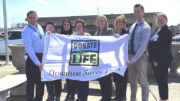As we took precautions in healthcare, my biggest anxiety was about the pregnant women I take care of every day. I am always aware, as an obstetrician, I am caring for more than one patient at the same time.
The recommendations and decisions I make take into account the needs of the mother and her unborn baby. Pregnant women are known to be at greater risk of severe morbidity and mortality from all respiratory infections which means they get sicker if they get infected.
What is typically a mild infection, can lead to complications in an otherwise normal pregnancy or make worse one already complicated by other co-existing medical conditions.
Our goal at Butler Health System, was to provide great care to our patients while limiting exposure to their loved ones and to everyone needed to care for them. In the wake of the rapidly evolving COVID-19 pandemic, we started a new approach to prenatal care.
We limited visits into the office to limit direct exposure to other sick or exposed patients. We initiated virtual visits for care that could be done remotely.
As we learned more about the virus, we adapted. It was gut-wrenching to have to tell an expectant couple that their family could not come meet their newborn baby in the hospital.
It was hard to shut Dads out of the pregnancy experience during prenatal visits. When the news release came about emergency use authorization for COVID vaccines, I celebrated, knowing we now had an option that could open the doors to normalcy for what should be such a joyous occasion for the entire family.
I had to make sure I had the same confidence in the COVID vaccines as the Tylenol I tell my patients to take for their headaches.
I researched and learned that the technology has been around for years. I know the global impact of the virus made it easier for researchers to raise money, reach study subjects and share information.
This sped up the usual time-consuming process it takes to get medications approved. We know from the studies before and the ongoing review of those who have received the vaccine, that there are no risks to the baby if you are pregnant, no risks if you get pregnant after, and no effects on your ability to get pregnant.
As a result, I was one of the first to get vaccinated on our team. There is a lot to learn as this virus adapts and mutates but what I do know is we have a safe vaccine that can help us gain grounds toward normalcy.
By Anie G. Perard, MD, FACOG
Director of Medical Affairs, BHS Clarion
President, Network Operations Council
The opinions and statements made in this feature are those of the authoring organization and not necessarily those of Venango Newspapers.










































